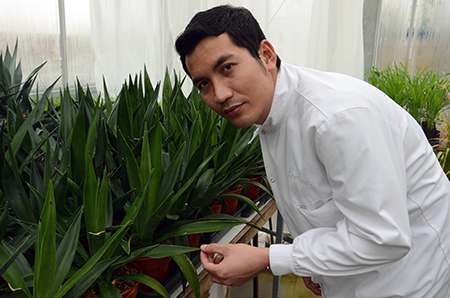
Biofuels have been heralded as having the potential to reduce our reliance on fossil fuels, by powering cars and generators with energy from plant biomass.
Unfortunately, many current biofuels start with food crops, and this can exacerbate the global food security crisis.
Agave sisalana
A PhD student at the University of Liverpool is studying a plant that may provide part of the solution to this problem. Agave sisalana is a proposed biofuel plant that can be grown in semi-arid conditions unsuited to food crops.
This plant is already grown for fibre in countries like Brazil, Tanzania, Kenya and Madagascar. Sisal fibre has traditionally been used for marine ropes, bailer twine, and rugs, but today it is also finding new uses such as reinforced plastic composites for car door panels.
Phaitun Bupphada is sponsored by the Agricultural Research Development Agency (ARDA), Thailand to investigate the genomic biology of agave within the Institute of Integrative Biology.
Supervised by plant biologist, Dr James Hartwell, Phaitun is investigating the genomic basis for agave’s ability to grow productively in dry regions. “Unlike most plants, agave opens the pores in its leaves and captures carbon dioxide during the cool, humid night,” he said. “It uses an adaptation of photosynthesis called Crassulacean acid metabolism (CAM), which means that it loses a lot less water during photosynthesis in comparison to major food crops like wheat or rice”.
In collaboration with Liverpool’s world-leading Centre for Genomic Research, Phaitun has sequenced RNA from agave leaves in order to gain a comprehensive understanding of the genes used for CAM photosynthesis. Long-term, the hope is that knowledge of which genes are important in agave will help accelerate its improvement as a biomass feedstock crop.
Reducing reliance on oil
Phaitun came to Liverpool as a result of a partnership that the ARDA has with the University. After completing his PhD, he will return to Thailand to work at the Agricultural Ministry, applying his new findings on research projects there.
He said: “Biofuels are a credible way of reducing our reliance on oil, but the areas in which they are grown requires careful planning. Understanding how plants like agave grow in marginal areas means we can maintain food supply, while also creating alternative sources of income for communities.”